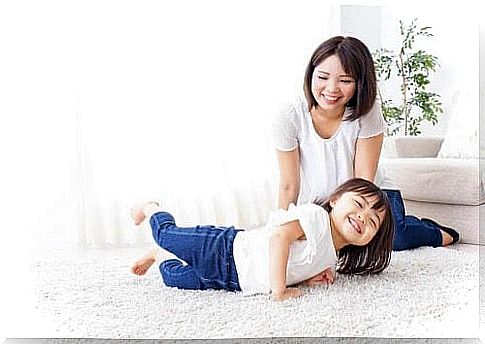Japanese Children Are Obedient And Always Listen To Their Parents

Japan is a country that gets a lot of admiration. Japanese children are obedient and, for example, always listen to their parents. They are well behaved, polite and attentive. These children learn to know and respect the rules.
Japanese children adapt their behavior to what is expected of them. This method of raising children is truly amazing.
Japanese parents are confident that their children will learn the appropriate behavior because they lead by example. In that sense, they feel responsible for how their children will become as adults.
Japanese children are obedient. You’re probably wondering how Japanese parenting makes kids always obey their parents.
Keep reading and get to know the key elements of Japanese upbringing. You will see that it is very different from the western educational practices that we know.
Japanese children are obedient and well behaved
The Kansas Association for Infant Mental Health has published a comparative study. The title of this study is “Discipline in Early Childhood”.
This study compares the parenting techniques of different societies. This found that Japanese families are focused on encouraging:
- attachment
- Empathy
- harmony

This research has also shown that Japanese children obey and learn to behave socially as adults as well. At home, however, the children are completely dependent on their parents, especially their mother.
Parents don’t discourage dependence either. Instead, they accept it and actually encourage it.
Through extreme closeness, Japanese parents reduce the individualistic tendency of young children to do what they want.
That’s also why most Japanese kids don’t have temper tantrums. There are, of course, always exceptions.
Bonding between parents and children in Japan
Parents, especially mothers, have a very close relationship with their children. In addition, the parents encourage this closeness and reinforce dependence.
In Japan, for example, it is customary for parents to dress and feed the children. They also continue the practice of parents and children sleeping together until their children are 6 years old.
The relationship between mother and child is intimate. They almost form a unit. Mother and child “share their thoughts” instead of being two separate and independent people. During the first three years of a child’s life, the mother takes the child everywhere with her.
In Japan, mothers are truly devoted to their children. So it is not often that a Japanese child goes to a daycare or preschool before the age of three. Formal schooling begins at this age.
Japanese parenting techniques
Many Japanese parents believe that their children behave well because the education is based on their philosophical beliefs: Confucianism.
This form of parenting stems from the Confucian ideal of teaching children with kindness. This virtue gives rise to tranquility and joy.

The fundamental parts of the Japanese way of raising children are based on this principle. We give you some examples below.
The power of suggestion
First of all, Japanese mothers use persuasion, suggestion and sometimes shame to raise children. In this way they avoid direct confrontations with their young children. Obviously, this reduces the child’s challenging or aggressive attitudes.
In addition, Japanese mothers use suggestion to tell their children what to do. Instead of saying “Pick up your toys!” , they say “What should you do with your toys now?” .
So the child must determine the correct answer and do what it is supposed to do. However, if the child does not want to do it and pretends not to have heard the question or suggestion, the mother will resort to subtle mocking. The child will then rather obey than feel ashamed.
The impact of gestures
A Japanese child is so attached to its mother that it is even aware of the mother’s emotions and gestures. Japanese children even know what state of harmony their mother is in. So the child will do everything in his power not to disturb that harmony.
When the mother proposes something, she also has an expression on her face. He tells the child that she would be surprised if they did not obey.

Yet the mother does not punish the child. She won’t scold it directly either. Again she tells the child with the expression on her face that she is disappointed.
The child is genuinely interested in maintaining harmony with its mother. So children avoid confrontation and do what is expected of them. Japanese children are obedient because they want to live up to this expectation.
Understanding and loving: Japanese children are obedient
In addition, Japanese mothers have also learned to read their children’s moods. They use this ability to change their persuasion technique whenever necessary.
For example, they notice that their child is not in the mood to answer a question. Then they will try their best not to ask their question at that time. They will likely ask the child to do something later.
For example, if the child refuses to pick up his toys, the mother will use polite mercy. She will say that the child is not ready or not developed enough to do that. She may also say that her child is too tired or that she just wants to continue playing.
Many Japanese parents do whatever it takes to make their children feel loved, valued and respected. They are the embodiment of:
- patience
- friendliness
- compassion
Japanese children are obedient as a result of this approach. This parenting style is definitely challenging for western moms. Would you like to try it?









